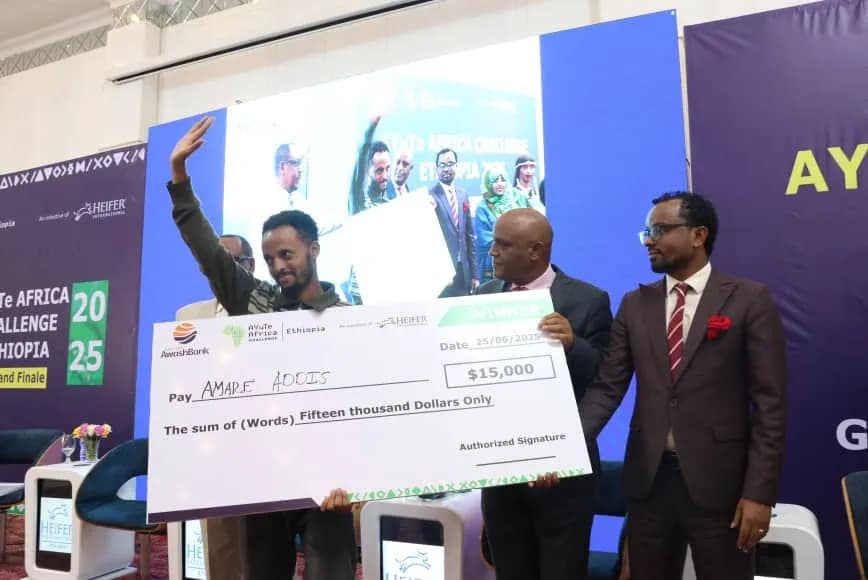Progress for 0 ad
Progress for 1 ad
Progress for 2 ad
Progress for 3 ad


Daniel Metaferiya
Addis Ababa, Ethiopia

Five Ethiopian agri-tech startups have been awarded a combined $40,000 after emerging as winners of the 2025 AYuTE Ethiopia Challenge, a national competition organized by Heifer International to foster innovation in agriculture among young entrepreneurs.
Now in its fourth year in Ethiopia, the AYuTE (Agriculture, Youth, and Technology) Challenge, an extension of the AYuTe Africa Challenge, attracted 319 applications from across the country. From that pool, 10 finalists were selected to compete for the top prizes. Nanex Biochar Solutions, a startup that produces enriched biochar from agricultural waste, took first place and claimed the $15,000 grand prize at the Haile Grand Hotel on Wednesday.
Amare Addis, Founder of Nanex, believes their product could significantly impact small-scale agricultural practices across the continent. He says their company already earns over 340,000 Birr in annual revenue from carbon credits and has been receiving interest from stakeholders.
“We are turning waste into something that goes back to help with farming,” Amare said.
Biochar is a charcoal-like substance that’s made by burning organic material from agricultural and forestry wastes (also called biomass) in a controlled process called pyrolysis. It is increasingly being adopted across the globe for its contribution to mitigating climate change, improving soil acidity, reducing waste, and producing energy as a byproduct.
The runner-up agri-tech innovations in this year’s AYuTE Challenge included biogas solutions, smart livestock collars, and hydroponic feed production.
Tewodros Yeshiwork, Heifer International’s Country Director, says they work to support smaller startups in Ethiopia while they incorporate established firms in their continental programs. He believes that coaching and support will allow the startups to scale their operations across the continent.
“We also enable them to partner with other entities, if we can’t align in the value chain,” the country director told Shega.
He hopes that recent talks with the Entrepreneurship Development Institute (EDI) to facilitate an accelerator program will further help the startups access insights and expertise. Tewodros also foresees additional financing opportunities potentially being unlocked through partnerships with local banks.
“We are pushing towards that,” he says.
For over 80 years, Heifer International has been working around the world to combat hunger through a range of initiatives. Founded by farmer Dan West, who believed that providing livestock could offer families a sustainable source of nutrition, the organization has since expanded its approach to include more comprehensive development programs. Headquartered in Arkansas, USA, Heifer International now operates through nearly 20 offices across the globe. The AYuTe Challenge offers up to $1.5 million catalytic grant, along with technical support to scale their solutions and expand their impact for African entrepreneurs.
Over the past four years, the challenge with GrowthTip Consulting PLC as an implementer in Ethiopia has increased both its cash offerings and the number of award recipients.
Mahider Solomon, Founder of Energetic Ecochar, a company that works to transform biomass into biochar, was hoping to crack the top five in this year’s competition. Despite finishing the competition in third place, she says the exposure will significantly help them in the long run in addition to the cash support.
While several agri-tech startups have attempted to tackle a variety of agricultural challenges over the past few years, most have remained incompatible with the domestic problems faced by farmers. Ethiopia’s agricultural sector continues to be dominated by traditional farming activities, resulting in limited productivity, even though it contributes nearly 34% to the country’s GDP.
👏
😂
❤️
😲
😠

Daniel Metaferiya
Daniel Metaferiya is a writer, journalist and radio host, with a keen interest in technology. He follows developments in Ethiopia's startup ecosystem closely and is passionate about profiling unique MSMEs.
Your Email Address Will Not Be Published. Required Fields Are Marked *